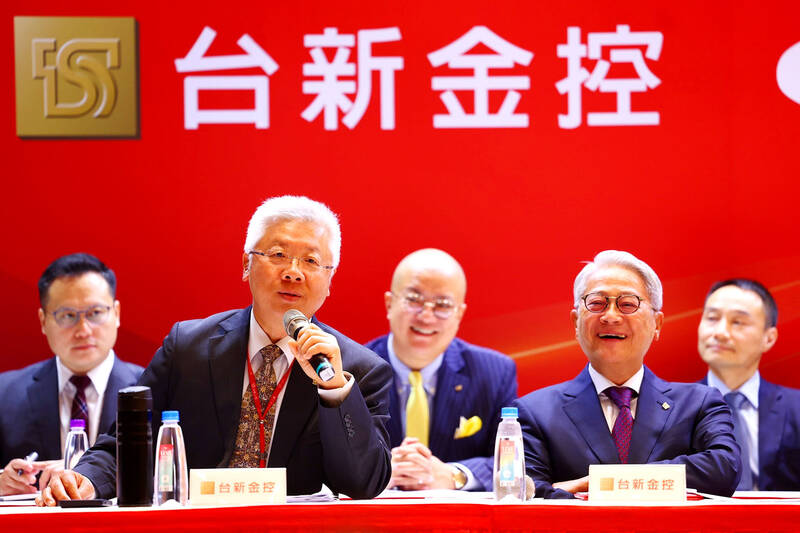The planned merger between Taishin Financial Holding Co (台新金控) and Shin Kong Financial Holding Co (新光金控) might take more than a year to conclude, meriting the removal of the two conglomerates and their subsidiaries from the credit watch list, Taiwan Ratings Corp (中華信評) said on Thursday.
The local arm of S&P Global Ratings placed the life insurance-focused Shin Kong Financial and the bank-oriented Taishin Financial under credit watch on Aug. 27 last year when the two announced the merger plan via share swaps.
“We believe the merger would require more time, giving us more time to assess the rating direction,” Taiwan Ratings credit analyst Eunice Fan (范維華) said.

Photo: CNA
Fan expects a time frame of 12 to 18 months, up from three to six months previously, to evaluate the rating direction of the combined group, and gain a better understanding of the integration and post-merger business and financial plans.
Taiwan Ratings stands by the negative outlook on Taishin Financial and Taishin Life Insurance Co (台新人壽). At the same time, it affirmed its “developing outlook” credit rating on Taishin International Bank (台新銀行).
The merger would soften Taishin Financial’s credit profile, because Shin Kong Financial is weaker financially, but will constitute a significant part of the combined group, Fan said.
The two sides have agreed to name the new entity Taishin-Shin Kong Financial Holding Co (台新新光金控), which would be Taiwan’s fourth-largest financial services provider by assets.
Taishin Financial would need additional resources to manage the integration given the large scale of both groups and the wide variety of units, Fan said, adding that synergy benefits would emerge only after effective integration.
Taishin Financial has delivered stable profitability, while Shin Kong Financial has stayed mostly in the red.
That explained why Taiwan Ratings affirmed its ratings on Shin Kong Financial with a positive outlook on the grounds that Shin Kong Financial’s credit profile would improve after the merger.
The agency also removed Shing Kong Financial, Shin Kong Life Insurance Co (新光人壽), Shin Kong Commercial Bank (新光銀行) and MasterLink Securities Corp (元富證券) from the credit watch list.
The positive outlook reflects Shin Kong Life’s stabilizing financial performance and expected benefits from the merger over the next 12 to 24 months, said Effie Tsai (蔡怡君), another Taiwan Ratings credit analyst.
The insurer posted a profit amid a somewhat favorable capital market last year, reversing losses in the previous two years, Tsai said.
Furthermore, capital increases likely bolstered Shin Kong Life’s risk-based capital ratio from 176 percent in 2023 to 220 percent last year, meeting the minimum requirement of 200 percent, the analyst said.
However, Shin Kong Financial was the only listed financial institute in Taiwan to record a loss last month, with the group pinning the blame on its life insurer.

Shiina Ito has had fewer Chinese customers at her Tokyo jewelry shop since Beijing issued a travel warning in the wake of a diplomatic spat, but she said she was not concerned. A souring of Tokyo-Beijing relations this month, following remarks by Japanese Prime Minister Sanae Takaichi about Taiwan, has fueled concerns about the impact on the ritzy boutiques, noodle joints and hotels where holidaymakers spend their cash. However, businesses in Tokyo largely shrugged off any anxiety. “Since there are fewer Chinese customers, it’s become a bit easier for Japanese shoppers to visit, so our sales haven’t really dropped,” Ito

The number of Taiwanese working in the US rose to a record high of 137,000 last year, driven largely by Taiwan Semiconductor Manufacturing Co’s (TSMC, 台積電) rapid overseas expansion, according to government data released yesterday. A total of 666,000 Taiwanese nationals were employed abroad last year, an increase of 45,000 from 2023 and the highest level since the COVID-19 pandemic, data from the Directorate-General of Budget, Accounting and Statistics (DGBAS) showed. Overseas employment had steadily increased between 2009 and 2019, peaking at 739,000, before plunging to 319,000 in 2021 amid US-China trade tensions, global supply chain shifts, reshoring by Taiwanese companies and

Taiwan Semiconductor Manufacturing Co (TSMC) Chairman C.C. Wei (魏哲家) and the company’s former chairman, Mark Liu (劉德音), both received the Robert N. Noyce Award -- the semiconductor industry’s highest honor -- in San Jose, California, on Thursday (local time). Speaking at the award event, Liu, who retired last year, expressed gratitude to his wife, his dissertation advisor at the University of California, Berkeley, his supervisors at AT&T Bell Laboratories -- where he worked on optical fiber communication systems before joining TSMC, TSMC partners, and industry colleagues. Liu said that working alongside TSMC

TECHNOLOGY DAY: The Taiwanese firm is also setting up a joint venture with Alphabet Inc on robots and plans to establish a firm in Japan to produce Model A EVs Manufacturing giant Hon Hai Precision Industry Co (鴻海精密) yesterday announced a collaboration with ChatGPT developer OpenAI to build next-generation artificial intelligence (AI) infrastructure and strengthen its local supply chain in the US to accelerate the deployment of advanced AI systems. Building such an infrastructure in the US is crucial for strengthening local supply chains and supporting the US in maintaining its leading position in the AI domain, Hon Hai said in a statement. Through the collaboration, OpenAI would share its insights into emerging hardware needs in the AI industry with Hon Hai to support the company’s design and development work, as well